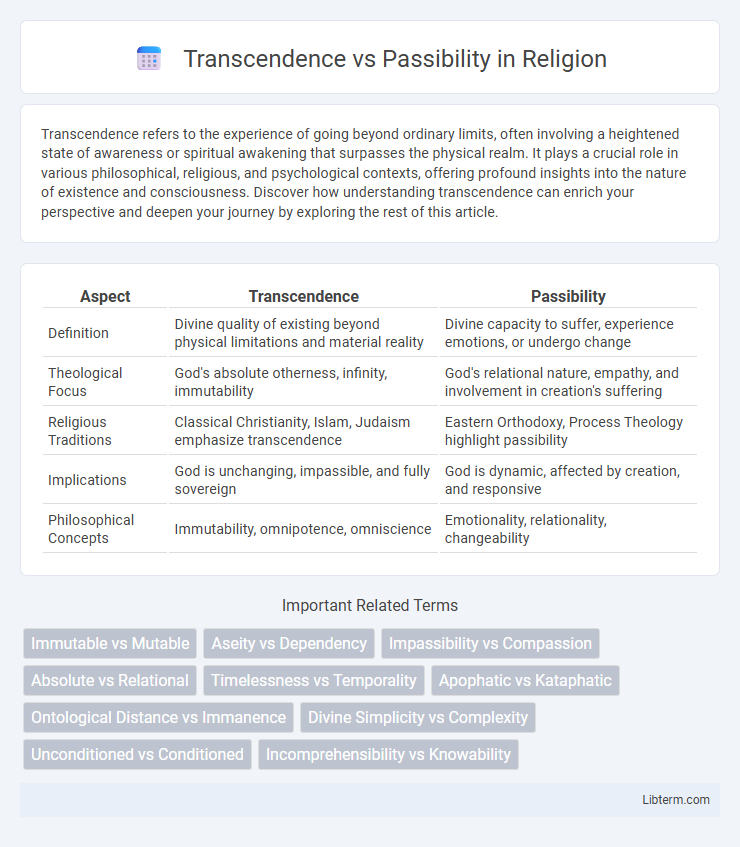Transcendence refers to the experience of going beyond ordinary limits, often involving a heightened state of awareness or spiritual awakening that surpasses the physical realm. It plays a crucial role in various philosophical, religious, and psychological contexts, offering profound insights into the nature of existence and consciousness. Discover how understanding transcendence can enrich your perspective and deepen your journey by exploring the rest of this article.
Table of Comparison
| Aspect | Transcendence | Passibility |
|---|---|---|
| Definition | Divine quality of existing beyond physical limitations and material reality | Divine capacity to suffer, experience emotions, or undergo change |
| Theological Focus | God's absolute otherness, infinity, immutability | God's relational nature, empathy, and involvement in creation's suffering |
| Religious Traditions | Classical Christianity, Islam, Judaism emphasize transcendence | Eastern Orthodoxy, Process Theology highlight passibility |
| Implications | God is unchanging, impassible, and fully sovereign | God is dynamic, affected by creation, and responsive |
| Philosophical Concepts | Immutability, omnipotence, omniscience | Emotionality, relationality, changeability |
Understanding Divine Transcendence
Divine transcendence signifies God's existence beyond and independent from the physical universe, emphasizing an infinite, immutable nature that surpasses human understanding and natural laws. This concept highlights God's otherness and holiness, underscoring that God is not subject to suffering, change, or limitations inherent in creation. Understanding divine transcendence fosters a recognition of God's supreme authority and inscrutability, distinguishing Him from passible beings capable of experiencing pain or alteration.
Exploring the Concept of Passibility
Passibility refers to the capacity of a being, particularly in theological contexts, to experience suffering or emotions, distinguishing it from transcendence which implies independence from such vulnerabilities. Exploring passibility involves examining how divine or metaphysical entities engage with temporal realities and human experiences through affective responsiveness. The concept challenges classical notions of an impassible deity, suggesting a dynamic interaction where the divine can suffer or change in relation to the world.
Historical Perspectives on Transcendence
Historical perspectives on transcendence emphasize its role in defining the divine as existing beyond physical limitations and temporal constraints, a concept central to classical theism and mysticism. Philosophers such as Plotinus and Aquinas articulated transcendence as a fundamental attribute distinguishing God from creation, highlighting an ontological separation that enhances the divine's perfection. This notion contrasts with passibility, where the divine is capable of experiencing suffering, and shapes theological debates on God's immutability and interaction with the world.
Philosophical Foundations of Passibility
Passibility, rooted in the philosophical tradition, asserts that entities, including divine beings, can undergo change, experience emotions, or suffer, contrasting with the concept of transcendence that emphasizes immutability and detachment from temporal conditions. Philosophical foundations of passibility trace back to thinkers like Aristotle, who acknowledged potentiality and change as intrinsic to existence, influencing later theological debates on divine nature and the extent to which God can be affected by creation. This concept challenges classical notions of divine impassibility by emphasizing relationality and the capacity for experiential interaction within metaphysical frameworks.
Transcendence in Major World Religions
Transcendence in major world religions often signifies the divine attribute of existing beyond and independent from the material universe, as seen in Christianity's portrayal of God as an omnipotent, immutable being distinct from creation. In Islam, Allah's transcendence emphasizes His absolute uniqueness and incomparability, highlighting that He is beyond human comprehension and physical limitations. Hinduism presents transcendence through Brahman, the ultimate reality that is beyond time, space, and causation, embodying the infinite and impersonal aspect of the divine.
Passibility and the Problem of Suffering
Passibility refers to the capacity to experience suffering and change, posing philosophical challenges in reconciling divine immutability with human pain. The Problem of Suffering highlights the difficulty in understanding how a benevolent, transcendent deity can permit or undergo suffering without compromising omnipotence or perfection. Passibility thus raises critical questions about the nature of divine empathy and the coexistence of suffering within spiritual transcendence.
Comparing Transcendence and Passibility
Transcendence refers to the attribute of existing beyond or independent from the physical universe and its limitations, highlighting a being's infinite and immutable nature. Passibility denotes the capacity to experience suffering or change, indicating a susceptibility to external influences or emotions. Comparing transcendence and passibility reveals the philosophical tension between an entity's absolute self-sufficiency and its vulnerability to temporal experiences.
Theological Debates: Impassibility vs. Passibility
Theological debates surrounding divine impassibility versus passibility center on whether God experiences emotions and suffering. Advocates of impassibility argue that God is immutable, unaffected by temporal events or human actions, emphasizing God's transcendence and perfection. Conversely, proponents of passibility assert that God participates in creation's suffering and change, highlighting a relational and compassionate divine nature.
Contemporary Views on Divine Nature
Contemporary theological discourse emphasizes transcendence as God's absolute self-sufficiency and otherness, while passibility explores the capacity of the divine to experience suffering and change. Process theology advocates for a passible God who is intimately affected by creation, contrasting classical theism's transcendence which asserts immutability and impassibility. Modern debates often center around how these attributes affect divine interaction with the world, human experience, and the problem of evil.
Implications for Faith and Spiritual Practice
Transcendence emphasizes God's existence beyond human experience, suggesting a faith grounded in reverence and mystery, while Passibility highlights God's capacity to suffer and empathize, fostering a relational and compassionate spirituality. These theological perspectives shape spiritual practices by influencing prayer, worship, and ethical behavior, either cultivating awe towards an immutable divine or nurturing intimate connection and vulnerability. The balance between Transcendence and Passibility informs believers' understanding of divine justice, mercy, and the nature of suffering, deeply impacting religious devotion and communal life.
Transcendence Infographic

 libterm.com
libterm.com